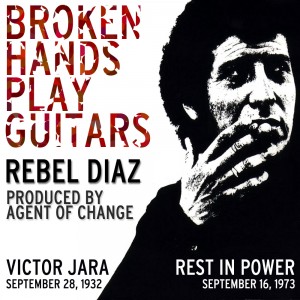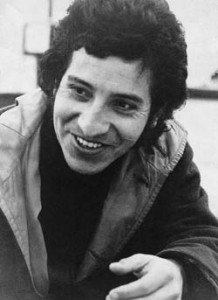Tribute to Victor Jara: Broken Hands Play Guitars
- September 27th, 2012
- By agentofchange
- Write comment
Rebel Diaz and Agent of Change celebrate what would have been Victor Jara’s 80th birthday with a firing new tribute track.
Victor Jara was one of the leaders of the Nueva Canción (spanish for ‘New Song’) movement – a movement based around “socially committed” music; music that takes a clear stand for freedom, against poverty, against imperialism and against human rights abuses. Nueva Canción gave voice to the millions of peasants, workers and indigenous peoples of Latin America who were being crushed under the weight of US economic and political dominance.
The date 11 September causes most westerners nowadays to think of the World Trade Centre attacks. However, for many, it will forever be remembered as the date on which, in 1973, the Chilean military overthrew the socialist government of Salvador Allende in a bloody coup. That coup, which brought the fascist Augusto Pinochet to power, was in large part planned and 100% supported by the United States (Henry Kissinger is on record as saying: “I don’t see why we need to stand by and watch a country go communist due to the irresponsibility of its own people. The issues are much too important for the Chilean voters to be left to decide for themselves.”)
 On 12 September 1973, Jara, along with several thousands of Allende supporters, was taken hostage by the military and taken to Chile Stadium (now known as Estadio Víctor Jara). Along with many others, he was beaten and tortured; his hands were broken, but his resolve was not. When soldiers taunted him and told him to play something on his guitar (in spite of his broken hands), he played Venceremos (We Will Win). On 15 September, he was murdered.
On 12 September 1973, Jara, along with several thousands of Allende supporters, was taken hostage by the military and taken to Chile Stadium (now known as Estadio Víctor Jara). Along with many others, he was beaten and tortured; his hands were broken, but his resolve was not. When soldiers taunted him and told him to play something on his guitar (in spite of his broken hands), he played Venceremos (We Will Win). On 15 September, he was murdered.
Across the world, Victor Jara is remembered as a hero and a martyr; an exemplary musician who put his skill and his passion entirely at the service of the struggle for a better life for humanity. In commemorating his death and celebrating his life, we should remember the principal lesson he teaches us: that culture is a weapon, one which must be wielded effectively in these times where oppression and repression are so prevalent. As Paul Robeson said, “The artist must elect to fight for freedom or slavery”.

